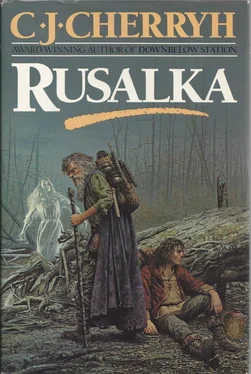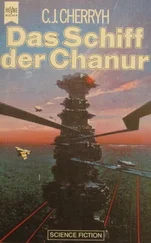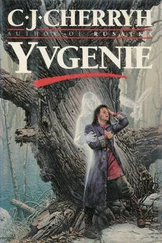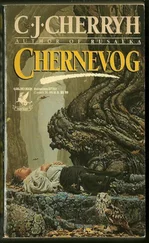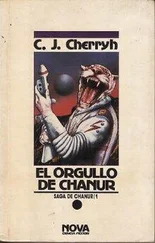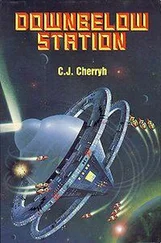He sprang up and away from the rail, grabbing Pyetr by the shirt—and Pyetr moved without a question, caught a rope with his left hand to steady them both.
But there were only the golden leaves, sunlit on the dark water, swirling away from their passage; and on the shore the source of those fading leaves, a willow leafed out bright gold and dying, against a haze of gray branches.
Eveshka’s tree. Hwiuur’s den.
No need to call out to master Uulamets to see: he could hardly fail to see. Sasha stood and watched until the v/ind carried them past; and when thac bank was out of sight behind the sail the precarious feeling of the deck urged they sit down—but not, Sasha thought, so close to the rail or in reach of the water. He pulled at Pyetr’s sleeve and drew him to sit at the foot of the mast.
Pyetr said nothing to this: he only looked back from that vantage, knees drawn up and his hand tacked against him; but when Sasha looked back there was nothing left to see but Eveshka standing by Uulamets at the tiller, the wind streaming their hair about their faces and fluttering at their clothes—as if they were gazing at something far away.
While the boat surged along with a steady, unhurried force, its sail full, no matter that the river had just bent.
Sasha settled forward again and locked his hands between his knees. The image of the tree haunted him, gold in a world of gray, the leaves on the river… He did not know why that should hang in his mind more than Uulamets at the tiller or the presence of the Thing in the river—he did not know why the sight of falling leaves could be that sinister.
Gold on gray. Dying amid the dead, a last vivid color against the lifeless forest, against the dark water.
Perhaps it was Eveshka’s freedom its dying signified.
He had no hesitation to accept magic and he had only small astonishment at winds that obeyed no set direction, only the understanding that it must take many wishes, one shifting to the next, to drive this boat.
But for some reason he kept seeing the gold leaves swirling in the current, and thinking that he should be wiser than he had been, because he should understand these things and he was failing, in some elementary way.
They were going farther and farther from Kiev, further from Pyetr’s dreams. That was one thing. He felt guilty for that.
And afraid.
Pyetr did not like boats; he had decided that from the first time the deck tilted under him and the boat gathered speed. When the bow began to pitch and the deck tilted markedly his heart sped, and when the sail would swing and the deck would pitch over in the other direction he clung to the rail he had been leaning on and wondered at what point the boat was going to turn over.
That Uulamets stood back there with his ghostly daughter, that the wind never increased or decreased, that Eveshka’s tree was shedding its leaves into the river—and that the vodyanoi swam beside or beneath the boat—what else did one expect? Wizards did what they wanted in this woods, wizards had taken him into their affairs, his hand hurt him miserably and for the first time in his life Pyetr Kochevikov felt completely helpless.
Not that drowning must be the worst that could happen, not that the vodyanoi was not waiting down there to lay its little black hands on him. None of these things was so terrible as that feeling in his stomach: he could not get the rhythm of the boat, to the extent he was likely to lean the wrong way at the wrong time and tumble right off the deck—
Naturally wizards could walk about with perfect balance and easy stomachs. They could wish not to fall off.
But he knew Uulamets wanted to drown him; and he was not going to stand up, no more than he was going to lean his head over that rail where the River-thing could grab it.
“Do you want something to eat?” Sasha asked him toward dark.
No. Definitely he did not.
Sasha got up and wobbled his way aft, holding on to the ropes and staggering the last distance while Pyetr watched anxiously and held on to the rail. Sasha made it all the way past the deckhouse to talk to Uulamets—about supper, one supposed.
Or about stopping. He earnestly hoped so.
Uulamets seemed to be talking to Sasha: he could not precisely see from where he was, even by ducking down. Then Sasha staggered back to the low deckhouse where they had stowed their supplies, and made the precarious trip back to Uulamets and his daughter, bringing them food and drink. Finally he came forward again, with a jug and a fistful of food, and staggered and reeled his way precariously to the bow.
Pyetr snatched at him and set him down hard on the boards.
“We’ll stop before dark,” Sasha said.
Thank the god, Pyetr thought.
Sasha pushed dried fruit and the jug at him.
Not even that.
No. Please god.
The boat pitched suddenly. Sasha grabbed his leg and grabbed the jug before it went sliding off the deck.
And had the temerity to grin at him. Pyetr scowled, jaw clamped, and took a tight hold on the rail. The wind had picked up, humming in the ropes, setting the very timbers of the aged boat creaking. Spray kicked up, a fine mist that slicked the rail and cooled the side of his face.
It went like that for a time, while the sun went down and the spray flew gold—until with a terrible ripping sound the sail parted, the deck pitched, and a rope snapped like twine and sang past their heads.
Pyetr grabbed Sasha, Sasha grabbed in vain at the jug, which went sliding halfway across the deck as the broken rope went on whipping about like a dying snake and the ripped sail fluttered and cracked overhead.
The boat righted itself and tossed like a drunken thing, but it still moved under its rag of a sail, gliding with fair speed toward a dark and tangled shore.
“I don’t like this,” Pyetr muttered under his breath, as the boat ran in. Trees were coming at them, dark and huge, shoreline branches rushing into their faces.
He flung himself down onto Sasha, knocking him flat and holding the rail with one arm as the boat shuddered over sand and branches came right over the bow, splintering and poking them with twigs.
The boat swung sideways to the shore then, floated free, and more branches splintered over their heads and all along the right side.
Then it was still, except the wild bobbing in the current, and Uulamets, astern, was shouting: “Fools! Get the ropes! Take down the sail! Hurry!”
Pyetr stumbled up to his feet, staggering in the pitch, and started untying the rope, cursing the while Sasha pulled to give him slack to get the knot free. The two of them let down the spar. Torn canvas billowed down around them while the boat scraped its whole side against the overhanging branches.
“Fine place,” Pyetr said, as Uulamets shouted at them to make the boat fast to the trees. Pyetr still felt the wobble in his knees when he crossed the uneasy deck; his firm hold on a small branch of a tree solidly wed to earth came as a profound relief in one sense. He flung the mooring rope over a larger branch and tied a solid knot.
But the deep night between the trees made him glad to look toward the twilight still sheening the water, and toward human voices aft—Uulamets sharply instructing Sasha how to tie a knot, Uulamets bidding Eveshka open the stores and make supper—
Certainly, Pyetr thought, they would get no farther in the dark tonight, and with the sail lying in rags, maybe not tomorrow. He dreaded the thought of going on, he felt uneasy to be spending the night against this wooded farther shore—and he felt especially uneasy that the sail had torn and the rope had parted all at once. A handful of wizards ought to manage better than that. Or at least—
“Have we gotten there?” he asked Uulamets as he came aft, with no more idea than he had ever had exactly where they were going. The last light was fast leaving, the river reflected a dim sky, and the constant lap of water and the scrape of branches against their hull made a dismally lonely sound.
Читать дальше
